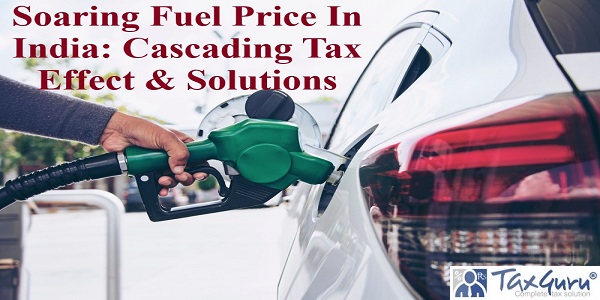Petrol prices in India crossed a century sometime back and almost half of 2/3rd of that are just Taxes. So who is responsible for this much price rise, centre or state? To answer this question, we need to understand the tax, we pay on fuel in India and reasons that can play a part in reducing the price and bring back to a normal which is just ₹75.
In India, 33% is the real cost of the fuel and the rest are just taxes that is 1/3rd is the real cost of the fuel and 2/3rd are just Taxes. One-barrel (159 L) crude oil is ₹4672. The Government of India pay just Rs29.7/litre along with this some additional charges like freight and insurance charges are added, then the crude oil is refined and different petroleum products are produced. For example, the base price of petrol is ₹31.82, the Dealers commission ₹3.6, freight charges ₹0.28. So the before-tax price that comes is equivalent to ₹35.7. Now there are central and state taxes on fuel. Central charges ₹33/litre as excise duty and different states levies different taxes on petrol ranging between ₹ 6 to 30 and therefore the price almost become triple for the consumers.

Lockdowns due to Covid-19 widespread and for the total ban on international travel, the demand of the crude oil went down and as a result, the Brent crude oil slipped from $ 66 per barrel in the early year 2020 to directly $19 per barrel in April 2020. Government of India took this opportunity and put double taxes on petrol and diesel although the price was almost negligible. As per recent development, “tax-on-tax on petrol, diesel earns states ₹1.2 trillion in two years”[1] shows that “The Union Government earned about ₹4.5 trillion as fuel excise revenue in the last two years, while states put together earned ₹3.2 trillion from fuel VAT, of which about ₹1.2 trillion was a tax-on tax”. We can see that during that pandemic situation government earned additional revenue by putting in double taxes. But in October 2020 when the situation improved, the demand for fuel started rising. Global prices of crude oil increased by 150% but the taxes that were put by the Government of India didn’t go down.
OPEC is the cartel that controls the oil prices worldwide. “Crude oil prices are determined by global supply and demand. Economic growth is one of the biggest factors affecting petroleum products. Growing economies increase demand for energy in general and especially for transporting goods and materials from producers to consumers” “OPEC adjusts member countries production targets based on current and expectations of future supply and demand. The tight market conditions put upward pressure on oil prices.” They control 75% of the world’s crude oil output. The whole world for the oil prices is like at the mercy of these countries “Islamic Republic of Iran, Iraq, Kuwait, Saudi Arabia and Venezuela”. When the price of crude oil starts falling due to some reason, these countries basically reduce the production of oil as well. Therefore, less oil supply in the world market will result in the global price rise in crude oils. “Oil Price surge as OPEC and its allies extend production cuts,” says “the OPEC+ group agreed in January to keep production steady for February and March. At that time, Saudi Arabia surprised markets by pledging to cut its production by an extra 1 million barrels per day, a move that reflected unease about fragile demand. Saudi Arabia agreed to extend its extra cut through April”[2].
As the crude oil price mainly depends on the Supply and demand system. Saudi Arabia is the largest exporter of OPEC group and the biggest oil company is “Aramco whose IPO was launched in later 2019 and now they are still planned to go for a second Aramco share sale.” So it is really clear that if the price of crude oil remains high then more investors will be interested in investing and therefore Saudi will be in profit. So this is also the reason why fuel prices are increasing worldwide. In 2013, “why petrol @100 isn’t about Crude oil”[3] the price of Crude oil was ₹110/barrel and at that time the petrol price was ₹76/ltr but currently in 2021 the price of the crude oil is ₹ 55/barrel but INDIAN people are paying ₹102/-. Still, the petrol price is more why as stated “taxes”.
An increase in petrol price also leads to inflation. As the price for the necessities also rises, so what is wrong? What can be the possible solutions?
Solutions:
Bring Petrol and Diesel under the GST law
The basic problem that we face today is the Tax on tax for fuels. 1st excise duty that is charged by the Central Government and VAT by the State Government. The “RBI monetary policy report is also saying that to cut fuel taxes to ease inflation concerns as out of exercise duty 41% the centre will be given back to the state for their spending”[4] The “SBI report said that if petrol and diesel will come under GST then the price of the petrol will come down to ₹75 and diesel to ₹68/litre”. The prices will become more uniform and transparent the calculation will be more or less like.
CALCULATION
| 1. Base Price of petrol | ₹30 |
| 2. Dealer commission | ₹3.6 |
| 3. Transportation prices | ₹3.8 |
| TOTAL PRICE BEFORE TAX | ₹ 37.4/- |
| 4. GST at 28% | ₹10.47 |
| 5. Cess | ₹30 |
| FINAL PRICE | ₹77.87 |
This decision will reduce the centre’s revenues will reduce significantly.
Tax on non-essential goods
During the period when the crude oil prices were down “Indian Government had raised excise duty in March. The exercise duty on petrol was raised to ₹32.98 per litre from ₹19.98 and diesel to 31.83 per litre from Rs 15.83. Every ₹1 a litre increased in excise duty adds approximately 14,500 crores to the Government’s kitty”. Today the Centre earned a revenue of about 4.5 Trillion by putting fuel exercise tax in the previous 2 years while if we collectively see all the states together they almost earned about ₹3.2 Trillion by putting state taxes “VAT” where most of the part are double taxes in the year. So if the fuel is brought under GST law of India this revenue will decrease and the main question that definitely arises in front of the Govt. that from where they will be earning more money? But if instead of finding the alternative if the Fuel is being reduced then socially it will be a good choice. Rising Fuel prices like Petrol, Diesel will also increase inflation in our country. It not only put an impact on those who use Petrol and diesel vehicles but also on the poor community people in India.
There are also certain things which puts a direct impact on the consumer of those goods only such as tobacco use India has the highest number of Tobacco users in the whole world. Almost 26000 people in India adults use tobacco. If the Govt. put just ₹1 cess on Tobacco items such as cigarettes and increasing the price of the tobacco items, the Government can earn ₹ 50cr as per the article mint “Cess on tobacco products can provide ₹ 50,000cr to fight pandemic: Health groups”[5] which clearly tells that if Govt. levies taxes on these products rather than fuels. It will not affect the common people in India. In India, the percentage of tax on cigarettes is 49% and smokeless tobacco is taxed to 63% and Bidis are taxed only at 22% in the current time. At the same time for every 100 earned from excise duty on tobacco products. India due to Economical Social and Health Care India losses 816.
So Smoking kills the country as well. WHO recommends tax that should be put on the retail price of all tobacco items should be at least 75%. Lottery, Gambling, game show like such windfall gains the tax that the Govt. of India put is just 30%. In the year 1999, the rate was 40% due to COVID-19 pandemic the rate should be increased to 35% to 40% as by this the Govt. will earn more revenue from those sectors which don’t put an impact in the common poor people as these don’t fall under daily essentials.
Then Taxes on Cryptocurrency “digital currency”. If India puts some clarity on cryptocurrency taxation. If it is done, then this would have generated an additional source of income through Taxes in the coming financial year in India. Rather than talking about raising taxes on fuels every year. It would be better if India should start thinking about all these alternatives. If done with few years, India will manage to bring down the fuel prices to just Rs. 75.
******
References:
[1] Abhishek Waghmare, ‘Tax-on-tax on petrol, diesel earns states Rs 1.2 trillion in two years (business-standard.com, 25 May 2018) < https://www.business-standard.com/article/economy-policy/tax-on-tax-on-fuels-earns-states-rs-1-2-trillion-in-two-years-118052401221_1.html > accessed 29 July 2021.
[2] Charles Riley, ‘Oil prices surge as OPEC and its allies extend production cuts’ (edition.cnn.com, 5 March 2021)
<https://edition.cnn.com/2021/03/04/investing/opec-oil-prices-saudi-russia/index.html> accessed 29 July 2021.
[3] www.timesofIndia.indiastimes.com, ‘Why Petrol @100 isn’t about Crude oil’ (timesofindia.indiastime.com, 29 May 2021) <https://timesofindia.indiatimes.com/india/why-petrol-100-isnt-about-crude-oil/articleshow/81058335.cms> accessed 29 July 2021.
[4] Anwesha Madhukalya, ‘Petrol Rs 75, diesel Rs 68! That’s what they will cost if under GST’ (business today. in, 04 March 2021) <https://www.businesstoday.in/latest/economy-politics/story/petrol-rs-75-diesel-rs-68-that-what-they-will-cost-if-under-gst-290007-2021-03-04> accessed 29 July 2021.
[5] Neetu Chandra Sharma, ‘Cess on tobacco products can provide ₹ 50,000 cr to fight pandemic: Health groups’ (livemint.com, 09 Jun 2020) <https://www.livemint.com/news/india/cess-on-tobacco-products-can-provide-rs-50k-cr-to-fight-pandemic-health-groups-11591718163949.html > accessed 20 July 2021.
******
This article is written by Aayush Akar, Student, National Law University Odisha and Debayan Samanta, Student, KIIT School of Law, Odisha





